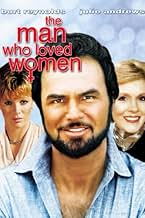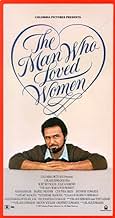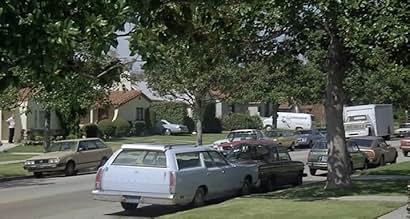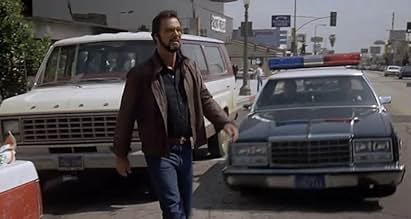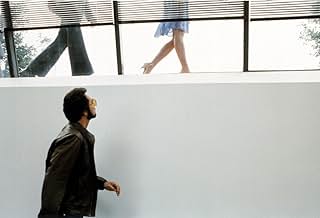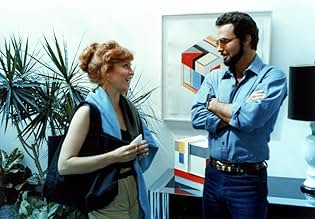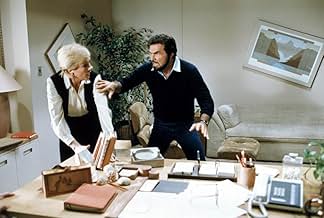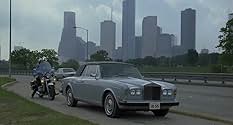CALIFICACIÓN DE IMDb
5.3/10
2.7 k
TU CALIFICACIÓN
Agrega una trama en tu idiomaA womanizing sculptor named David goes to seek help from a psychiatrist, Marianna, to cure him of his obsession with women.A womanizing sculptor named David goes to seek help from a psychiatrist, Marianna, to cure him of his obsession with women.A womanizing sculptor named David goes to seek help from a psychiatrist, Marianna, to cure him of his obsession with women.
- Dirección
- Guionistas
- Elenco
Cynthia Sikes Yorkin
- Courtney
- (as Cynthia Sikes)
Herb Tanney
- Doctor
- (as Schweitzer Tanney)
Opiniones destacadas
Seriocomic portrait of a middle-aged teenager. In the 1960s and 1970s, there were a slate of films about sensitive men who "loved" women. Sad attempts by so-called enlightened men to justify how their raging libidos were not at odds with them being feminists. They weren't womanizers, you see. They just loved women so much they couldn't stop at one. The Reese's peanut butter cups approach to adult relationships. Gene Siskel used to really love these types of films. It did not shock me to learn he gave this film three out of four stars.
This is a remake of a 70s film I haven't seen. It already feels like a relic by 1983. Blake Edwards, a director I've never been particularly enamored of outside of Breakfast at Tiffany's, can't seem to decide if we are to take this dreck seriously or not. The film introduces us to our horndog hero, played by Burt Reynolds who at this time was desperate to get away from success and achieve that which all box office stars seek eventually - "to be taken seriously as an AK-TOR!" What follows is an eyerollathon of good looking adults flirting with the finesse of children. There's sex, even some brief nudity from Marilu Henner, but the movie is never sexy. Nor is it fun. It certainly never approaches anything resembling funny. It's a slow, dry exercise in trying to provide sophistication and depth to Andy Hardy. Still, this is Burt before his mid-80s accident that he never fully recovered from. Whatever charms the movie has comes entirely from him.
This is a remake of a 70s film I haven't seen. It already feels like a relic by 1983. Blake Edwards, a director I've never been particularly enamored of outside of Breakfast at Tiffany's, can't seem to decide if we are to take this dreck seriously or not. The film introduces us to our horndog hero, played by Burt Reynolds who at this time was desperate to get away from success and achieve that which all box office stars seek eventually - "to be taken seriously as an AK-TOR!" What follows is an eyerollathon of good looking adults flirting with the finesse of children. There's sex, even some brief nudity from Marilu Henner, but the movie is never sexy. Nor is it fun. It certainly never approaches anything resembling funny. It's a slow, dry exercise in trying to provide sophistication and depth to Andy Hardy. Still, this is Burt before his mid-80s accident that he never fully recovered from. Whatever charms the movie has comes entirely from him.
In the climactic moment of one of the great film scripts of all time, "The Verdict" by David Mamet, attorney Edward Concannon (James Mason) implores the judge, "We can't be expected to accept a (photo)copy when we have the original."
Many consider Truffaut's 1977 "L'homme qui aimait les femmes" a wonderful film. Anyone who has seen this original, need not venture to this 1983 remake, the land of Blake Edwards, his family and his friends.
This film likely falls under the category of 'the studio still needs another film from me (Edwards) and I have not a single inspired idea'.
Don't get me wrong. I'm an avid fan of Edwards, and consider many of his films (notably Days of Wine and Roses, Breakfast at Tiffanys, S.O.B., and Operation Petticoat to ALL be amongst my favorites. Of course the Pink Panther series is a masterpiece in and of itself.
But this film is weak, and uninspired, laden with narrative-I've never really figured who came up with the idea of opening a 'comedy' with the main character's funeral, and an accompanying heart-wrenching eulogy from one of his lovers.
Don't accept a copy when the original is available.
Many consider Truffaut's 1977 "L'homme qui aimait les femmes" a wonderful film. Anyone who has seen this original, need not venture to this 1983 remake, the land of Blake Edwards, his family and his friends.
This film likely falls under the category of 'the studio still needs another film from me (Edwards) and I have not a single inspired idea'.
Don't get me wrong. I'm an avid fan of Edwards, and consider many of his films (notably Days of Wine and Roses, Breakfast at Tiffanys, S.O.B., and Operation Petticoat to ALL be amongst my favorites. Of course the Pink Panther series is a masterpiece in and of itself.
But this film is weak, and uninspired, laden with narrative-I've never really figured who came up with the idea of opening a 'comedy' with the main character's funeral, and an accompanying heart-wrenching eulogy from one of his lovers.
Don't accept a copy when the original is available.
Has there ever been a film where Julie Andrews didn't do a good job? I thought she was great as David Fowler's analyst--so calm and poised, regardless of how ridiculous Fowler's problems got, or how agitated he became. Burt Reynolds was ... well, Burt Reynolds, but that's enough. Barry Corbin seemed a natural for the role of a Texas oilman/rancher in a cowboy hat. If he wasn't on 'Dallas' (and I don't think he was in the years I watched it), he should have been. I liked Marilu Henner as Agnes but wish we had seen more of her. I didn't recognize Kim Basinger or Sela Ward, but I like them both in most of what I've seen.
It wasn't a great film, but a good one. It was funny enough of the time, though it could be depressing.
It wasn't a great film, but a good one. It was funny enough of the time, though it could be depressing.
I just saw The Man Who Loved Women, and I found it to be a rather delightful movie. It's a plot you don't see to often; it's focused on one man and his love of women. The movie may seem pointless, but you'll get it once you see the ending. I won't ruin it here, but it was kind of depressing and unexpected, and looking back on the movie, I enjoyed it much more afterwards than during. It's not the most exciting movie. You won't see any amazing or dynamic cinematography or camera angles that are all to creative. In fact, it seems more like a movie from the '70's than 1983 in the way it was filmed, but if you like the kind of movies that you enjoy much more after having looked back on everything, I think you'll find this a rather enjoyable work.
Here is a picture that, for every conceivable reason, shouldn't work -- but on a purely emotional level, it does. Most viewers could be easily misled (and disappointed) by expecting a light romantic comedy or a wild sex farce. Instead, Blake Edwards and his co-screenwriters offer something entirely different, a picture far more complex, meaningful, and thought-provoking than what we might anticipate.
"The Man Who Loved Women" tells a sad, sad story about a middle-aged man (Burt Reynolds in one of his finest performances, as David Fowler) who drowns in isolation thanks to a rare ability: he's forced and driven, by instinct, to glimpse the sacredness and inner beauty of almost every woman he encounters. Yes, on some levels, his circumstances lead to a hedonistic paradise. But his feelings also prevent him from ever making a commitment, and isolate him from the joy of knowing one woman exclusively.
For that reason, a melancholic canopy hangs over the entire film and takes the front seat to humour. The story begins with David Fowler's death, and every event we witness onscreen is tinged by our knowledge that Fowler's obsession with women will eventually kill him. A slow, heavy, stringed theme song, Mancini's "Little Boys", plays softly throughout the film, and Fowler's words (in voice-over narration) constantly remind us of the deep, incurable loneliness that plagues him.
All of this might sound heavy-handed -- and it very well could be, if it weren't for the sexual fantasy and wild Edwards comedy that flesh out the story and provide relief. The melancholia and comedy work together, and Edwards achieves a delicate balance of mood --a bittersweet aura.
I've heard one criticism (see Ebert's review) that many of the story's psychological elements are impossible. Though a few scenes might suffer from exaggeration (hundreds and HUNDREDS of women attend David's funeral), one could easily dismiss the story -- as I did, at first --because so many male viewers *lack* Fowler's ability to care for women unconditionally; we want to believe that it's impossible for a contemporary Don Juan to exist. But that simply isn't tenable. My own theory about the film -- (and it's just a theory) -- is that Edwards may have pulled inspiration for Fowler from the late John Derek, another man worshipped and adored by women, who interacted with Edwards during the filming of "10" (1979).
Edwards and his co-writers lend a gentle touch to the film by crafting Fowler's character against-the-grain; while we might expect a narcissistic hedonist, he's just the opposite -- a warm, gentle, soul with only the sincerest motives. It's easy to understand why women are attracted to Fowler, from his first appearance onscreen. And, oddly -- male viewers may never begrudge Fowler his affairs, only applaud -- because his narration and his gentle spirit confirm the fact that he really does worship and adore everything about the girls who walk in and out of his life. "I keep thinking," he says sadly, "about all the women I'm never gonna know..."
In one of the film's most revealing and effective moments, Edwards allows us to glimpse a woman, at the funeral, who is the complete opposite of a "10" -- fat, homely, depressed -- undesirable. We have the distinct impression that her external appearance didn't matter to Fowler -- that he only looked into her heart and perceived her beauty. It lends credibility to psychologist Marianna's (Julie Andrews) observation: that David did, indeed, love all of the girls, equally and unconditionally.
"The Man Who Loved Women" tells a sad, sad story about a middle-aged man (Burt Reynolds in one of his finest performances, as David Fowler) who drowns in isolation thanks to a rare ability: he's forced and driven, by instinct, to glimpse the sacredness and inner beauty of almost every woman he encounters. Yes, on some levels, his circumstances lead to a hedonistic paradise. But his feelings also prevent him from ever making a commitment, and isolate him from the joy of knowing one woman exclusively.
For that reason, a melancholic canopy hangs over the entire film and takes the front seat to humour. The story begins with David Fowler's death, and every event we witness onscreen is tinged by our knowledge that Fowler's obsession with women will eventually kill him. A slow, heavy, stringed theme song, Mancini's "Little Boys", plays softly throughout the film, and Fowler's words (in voice-over narration) constantly remind us of the deep, incurable loneliness that plagues him.
All of this might sound heavy-handed -- and it very well could be, if it weren't for the sexual fantasy and wild Edwards comedy that flesh out the story and provide relief. The melancholia and comedy work together, and Edwards achieves a delicate balance of mood --a bittersweet aura.
I've heard one criticism (see Ebert's review) that many of the story's psychological elements are impossible. Though a few scenes might suffer from exaggeration (hundreds and HUNDREDS of women attend David's funeral), one could easily dismiss the story -- as I did, at first --because so many male viewers *lack* Fowler's ability to care for women unconditionally; we want to believe that it's impossible for a contemporary Don Juan to exist. But that simply isn't tenable. My own theory about the film -- (and it's just a theory) -- is that Edwards may have pulled inspiration for Fowler from the late John Derek, another man worshipped and adored by women, who interacted with Edwards during the filming of "10" (1979).
Edwards and his co-writers lend a gentle touch to the film by crafting Fowler's character against-the-grain; while we might expect a narcissistic hedonist, he's just the opposite -- a warm, gentle, soul with only the sincerest motives. It's easy to understand why women are attracted to Fowler, from his first appearance onscreen. And, oddly -- male viewers may never begrudge Fowler his affairs, only applaud -- because his narration and his gentle spirit confirm the fact that he really does worship and adore everything about the girls who walk in and out of his life. "I keep thinking," he says sadly, "about all the women I'm never gonna know..."
In one of the film's most revealing and effective moments, Edwards allows us to glimpse a woman, at the funeral, who is the complete opposite of a "10" -- fat, homely, depressed -- undesirable. We have the distinct impression that her external appearance didn't matter to Fowler -- that he only looked into her heart and perceived her beauty. It lends credibility to psychologist Marianna's (Julie Andrews) observation: that David did, indeed, love all of the girls, equally and unconditionally.
¿Sabías que…?
- TriviaThis movie, a remake, was released six years after François Truffaut's source French movie El hombre que amaba a las mujeres (1977).
- ErroresWhen Julie Andrews unwraps the book on the plane, the front cover is visible before she flips it over to face her, but then when it is shown from her point of view, it looks completely different.
- Citas
Agnes Chapman: You're a fast worker. I better leave before one of us gets pregnant.
David Fowler: I'm not that fast.
- Bandas sonorasLittle Boys (theme song)
Music by Henry Mancini
Lyrics by Alan Bergman & Marilyn Bergman
[Played over the closing credits]
Performed by Helen Reddy
Selecciones populares
Inicia sesión para calificar y agrega a la lista de videos para obtener recomendaciones personalizadas
- How long is The Man Who Loved Women?Con tecnología de Alexa
Detalles
- Fecha de lanzamiento
- País de origen
- Sitio oficial
- Idiomas
- También se conoce como
- Frauen waren sein Hobby
- Locaciones de filmación
- Houston, Texas, Estados Unidos(Texas scenes.)
- Productoras
- Ver más créditos de la compañía en IMDbPro
Taquilla
- Presupuesto
- USD 12,000,000 (estimado)
- Total en EE. UU. y Canadá
- USD 10,964,740
- Fin de semana de estreno en EE. UU. y Canadá
- USD 1,347,032
- 18 dic 1983
- Total a nivel mundial
- USD 10,964,740
- Tiempo de ejecución1 hora 50 minutos
- Mezcla de sonido
- Relación de aspecto
- 1.85 : 1
Contribuir a esta página
Sugiere una edición o agrega el contenido que falta

Principales brechas de datos
By what name was The Man Who Loved Women (1983) officially released in India in English?
Responda

